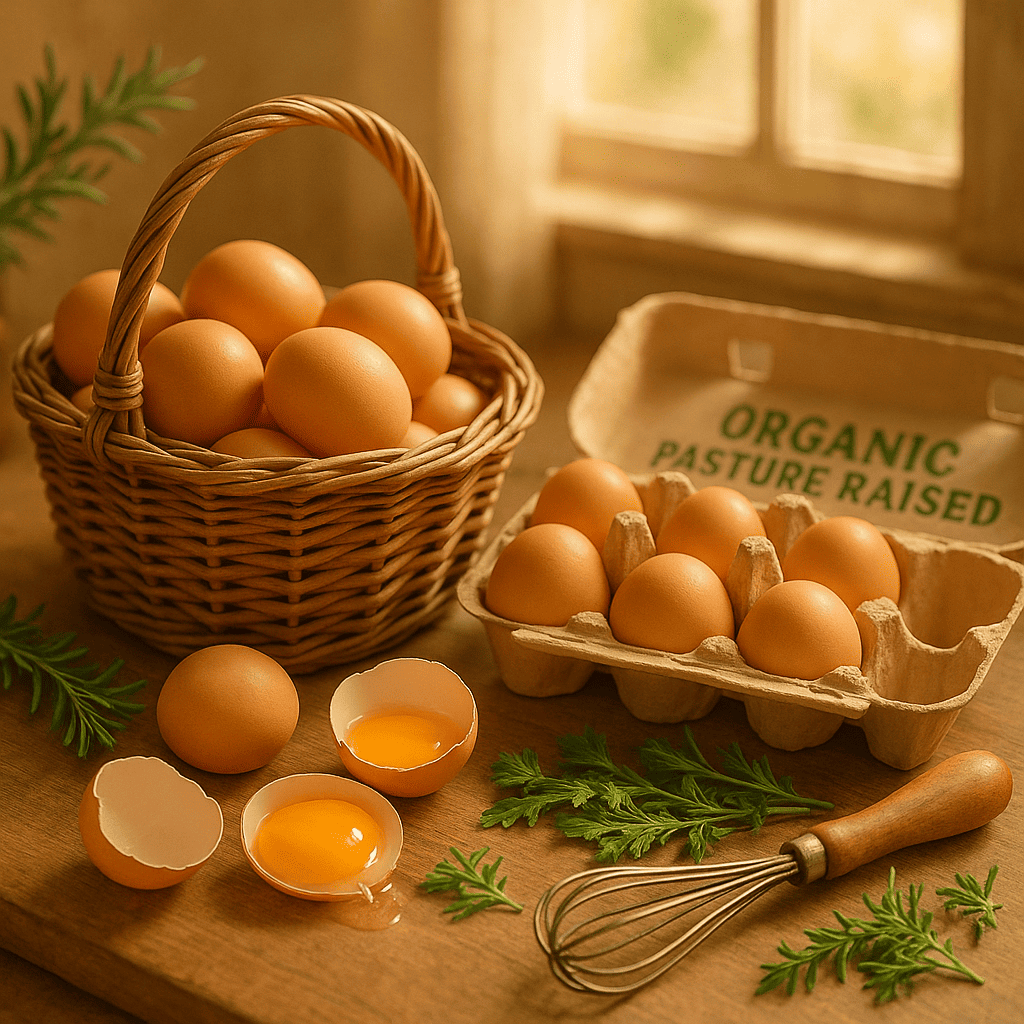Organic pasture raised eggs are gaining popularity for good reason. In this article, we explore what makes these eggs so special from how they’re produced to how they benefit your health, cooking, and values. You’ll learn the real difference between organic and pasture-raised labels, uncover surprising nutritional advantages, and weigh possible drawbacks like cost and safety. We’ll also answer key questions many people have before switching. Whether you’re a health-focused foodie or a curious home cook, this guide will help you make smarter choices at the grocery store and in your kitchen using organic pasture raised eggs as a core ingredient.

Table of Contents
Why We Love Organic Pasture Raised Eggs
Our family kitchen story : connecting food with love
Our journey with organic pasture raised eggs started in the most unexpected way. It was a quiet Saturday morning, and we were visiting a local farmer’s market in Santa Fe.
Liam, our six-year-old, spotted a basket of brown-shelled eggs marked “organic pasture raised” and was drawn in by the farmer’s stories about the happy hens roaming under the sun.
We cracked those eggs the next morning and were stunned by the rich orange yolks. Andre turned them into a soulful scramble, and I whipped up pancakes on the side. The taste was deeper, creamier, and more satisfying than any store-bought eggs we had ever used.
These eggs quickly became a staple in our kitchen. We use them in everything from Liam’s quick weekday breakfasts to weekend baking experiments.
Our pup Coco usually lurks under the table waiting for scraps, while music plays and the pan sizzles.
There’s something about using ingredients like organic pasture raised eggs that brings more joy and intention to our meals. They’ve turned everyday cooking into a mindful experience.
What Makes Organic Pasture Raised Eggs Unique
Not all eggs are created equal. Organic pasture raised eggs come from hens that live outside during the day with real access to green pastures.
They’re also fed certified organic, non-GMO feed. That combination matters.
These eggs carry stronger nutritional profiles, with yolks richer in color and flavor due to the hens’ varied diet of insects, seeds, and plants.
Because they roam and eat naturally, their eggs contain more omega-3s, vitamin D, and antioxidants. You can actually see and taste the difference.
How It Became Part of Our Everyday Cooking
Before we made the switch, we didn’t think eggs could be this different.
But now, we reach for organic pasture raised eggs for nearly everything: frittatas, muffins, even French toast.
They’re reliable, cook evenly, and lend a fullness to dishes that ordinary eggs simply don’t.
Best of all, they fit our busy life.
Whether we’re packing a school lunch or rushing to get dinner ready after soccer practice, these eggs keep things easy and flavorful.
It’s a simple upgrade that transformed the way we eat.
Easy Recipes Using Organic Pasture Raised Eggs
Creamy Baked Egg Cups with Spinach and Feta
When you want something fast, flavorful, and nourishing, these baked egg cups are a go-to in our house.
We make them almost weekly, using organic pasture raised eggs because they’re richer in taste and texture.
To start, preheat your oven to 350°F and lightly grease a 6-cup muffin tin.
In a skillet, sauté 1 cup of chopped baby spinach with 1 minced garlic clove in 1 tsp olive oil until just wilted.
In a bowl, whisk 4 organic pasture raised eggs with 2 tbsp milk or cream, a pinch of salt, and a dash of black pepper.
Divide the sautéed spinach into each muffin cup, crumble in about ¼ cup of feta cheese, then pour the egg mixture evenly over the top.
Bake for 18–20 minutes, or until the eggs are just set.
Let them cool slightly before removing.
These protein-packed bites are perfect warm or cold, and they reheat like a dream.
Why This Recipe Works for Real Life
This recipe is quick to prep, freezable, and flexible; perfect for school mornings or weekend brunch.
You can swap spinach for kale, use goat cheese instead of feta, or add chopped cherry tomatoes or herbs.
But the secret to making them truly crave-worthy is using organic pasture raised eggs.
Their bright yolks and rich texture transform a simple egg cup into something special.
They’re packed with clean protein and healthy fats, and they bake beautifully.
Whether you’re feeding your kids, prepping meals for the week, or hosting brunch, this recipe delivers every time.
Nutrition & Health Benefits of Organic Pasture Raised Eggs
Hidden nutrient powerhouse
Organic pasture raised eggs aren’t just better for the environment and animals, they’re better for your body too.
Compared to conventional eggs, they offer significantly more nutrition per bite.
Studies show they contain higher levels of omega-3 fatty acids, vitamins A, D, E, and K, and important antioxidants like lutein and zeaxanthin.
These nutrients support brain function, eye health, and a stronger immune system.
Since the hens forage for insects, seeds, and grasses, their diet leads to yolks that are denser in nutrients and brighter in color.
One of the biggest wins for our family was choline.
This nutrient supports brain development in kids and cognitive function in adults.
Liam’s pediatrician actually mentioned it, which led us to look into the eggs we were buying.
Organic pasture raised eggs are one of the richest natural sources of choline, with around 125 milligrams per large egg.
That’s especially helpful for busy parents who want to feed their families well without complicated meal plans.
We’ve also found that eating just two of these eggs provides over 60 percent of the daily recommended intake of vitamin D.
That’s a big deal, especially in colder months when sun exposure is limited.
It’s reassuring to know a simple breakfast choice can boost immunity and mood.
Balanced fats and anti-inflammatory nutrients
Not all fats are created equal.
Organic pasture raised eggs are a great source of healthy fats, especially omega-3s like DHA and EPA.
These fats help reduce inflammation, support heart health, and even aid hormone balance.
Conventional eggs don’t come close in this area.
In fact, the omega-3 content in pasture raised eggs can be up to five times higher, with a better omega-6 to omega-3 ratio.
Why does this matter?
Our modern diets are typically overloaded with omega-6 fats from processed foods, which can lead to chronic inflammation.
Including more omega-3-rich foods helps correct that balance.
By simply switching to organic pasture raised eggs, you naturally boost your intake of anti-inflammatory nutrients.
Here’s a quick comparison table to show how organic pasture raised eggs stack up:
| Nutrient (per large egg) | Conventional Eggs | Organic Pasture Raised Eggs |
|---|---|---|
| Omega-3 Fatty Acids | ~50 mg | 250–300 mg |
| Vitamin D | 37 IU | 100–150 IU |
| Vitamin E | 0.5 mg | 1.0–1.5 mg |
| Choline | 113 mg | 125–130 mg |
| Lutein & Zeaxanthin | 200 mcg | 600–800 mcg |
These eggs fuel your body with clean, efficient energy and help you feel full longer.
That’s why we lean on them for breakfast, post-workout meals, and midweek dinners.
They’re simple, reliable, and nourishing every time.
Organic vs. Pasture-Raised: What’s the Difference?
Organic certification explained
Many shoppers assume “organic” and “pasture-raised” mean the same thing. They don’t.
In fact, understanding the difference can help you make smarter choices at the grocery store.
Organic eggs come from hens that are fed certified organic feed; meaning it’s free from synthetic pesticides, herbicides, and GMOs.
These hens are not given antibiotics or hormones, and their welfare is prioritized under USDA organic standards.
However, the “organic” label does not guarantee that hens had meaningful outdoor access.
That’s where confusion starts.
A carton marked “organic” might still come from hens that rarely see daylight if they’re raised in crowded barns with minimal outdoor space.
On the flip side, “pasture-raised” hens spend most of their day outdoors with at least 108 square feet of pasture per bird.
They roam freely, eat grass, forage for insects, and live much more natural lives.
Yet, pasture-raised eggs are not necessarily organic unless the label clearly states so.
It’s important to read the fine print.
A truly premium egg will be both organic and pasture-raised.
That’s the sweet spot, combining the best of clean feed and healthy outdoor access.
Pasture-raised alone vs. organic pasture raised
Let’s break this down even further.
If you’re buying pasture-raised eggs that aren’t organic, the hens may still get conventional feed, which can include GMOs and pesticides.
That undermines many of the benefits people look for in ethical or clean eating.
On the other hand, organic eggs from confined spaces don’t match the rich nutrition of pasture-raised ones.
Here’s a comparison to guide your choices:
| Label Type | Outdoor Access | Organic Feed | Animal Welfare | Nutritional Value |
|---|---|---|---|---|
| Cage-Free | No | No | Low | Low |
| Free-Range | Limited | No | Moderate | Moderate |
| Organic (only) | Limited | Yes | Moderate | Moderate |
| Pasture-Raised (only) | Yes | No | High | High |
| Organic Pasture-Raised | Yes | Yes | Highest | Highest |
This is why we now always choose eggs labeled organic pasture raised.
The difference in flavor, color, and cooking performance is noticeable.
We’ve even done blind taste tests with friends and every time, these eggs win.
For us, they strike the perfect balance of sustainability, nutrition, and joy.
Conclusion
Organic pasture raised eggs have become a quiet hero in our kitchen. They offer more than better nutrition, they bring depth to meals, support ethical farming, and help us cook with more intention. From early-morning scrambles to weekend brunches, they’ve earned their place at our table. If you’re ready to make a small shift with big impact, start with the eggs in your fridge. Choose organic pasture raised, and taste the difference in every bite.
Follow us on Instagram and Facebook for daily cooking inspirations!
FAQ about Organic Pasture Raised Eggs
Are organic pasture raised eggs healthier?
Yes. They contain more omega-3s, vitamins, and antioxidants than conventional eggs, and they come from hens fed clean, organic diets while living outdoors.
Do eggs need to be organic if they are pasture-raised?
Ideally, yes. Pasture-raised hens may still eat conventional feed unless labeled organic. For full benefits, choose eggs labeled both organic and pasture raised.
What are the disadvantages of pasture-raised eggs?
Higher cost, limited availability in some regions, and potential labeling confusion. Look for third-party certifications to ensure you’re getting what you pay for.
Which eggs are best, pasture-raised or organic?
The best option is a combination: organic pasture raised eggs. They deliver superior nutrition, better animal welfare, and cleaner production methods.

Organic Pasture Raised Eggs: Unlock Unmatched Taste, Health & Heart
Ingredients
- 4 organic pasture raised eggs
- 2 tablespoons milk or cream
- 1 cup chopped baby spinach
- 1 garlic clove minced
- 1 teaspoon olive oil
- 1/4 cup crumbled feta cheese
- Salt and black pepper to taste
- Nonstick spray or butter for greasing muffin tin
Instructions
- Preheat oven to 350°F and grease a 6-cup muffin tin.
- Sauté minced garlic and chopped spinach in olive oil until wilted.
- In a bowl, whisk eggs, milk, salt, and pepper.
- Divide sautéed spinach into muffin cups.
- Top with crumbled feta cheese.
- Pour egg mixture evenly into each cup.
- Bake for 18–20 minutes or until eggs are set.
- Let cool slightly before removing from the tin.